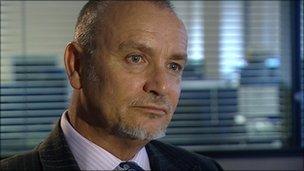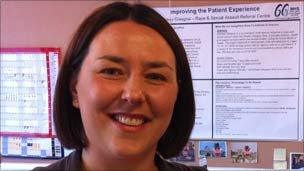Sex crimes prosecutor urges caution in rape law changes
- Published

Derek Ogg QC said a prosecutor's job was not to get convictions at any cost
The head of Europe's first specialist unit investigating serious sex crimes has said politicians must be cautious in considering changes to the way rape cases are handled in Scotland.
Derek Ogg QC, 56, has stepped down as senior prosecutor in Scotland's National Sex Crimes Unit.
Ministers are looking at ways of making it easier to secure rape convictions.
Scotland has been criticised for having one of Europe's lowest conviction rates - around 3%.
The Crown Office has disputed the figures which it said were based on the number of rape allegations which resulted in a conviction, and included cases where there was insufficient evidence to take to court or where a suspect could not be identified or traced.
In 2008-09 it said 32% of charges, external reported to the procurator fiscal and subsequently indicted resulted in a conviction.
But Mr Ogg, who was appointed to lead the Sex Crimes Unit in 2009 said these figures were "unfair and unjust" and deterred people from coming forward if they have been assaulted.
Satisfactory statistic?
He said: "They say 'there's a 97-3 chance nothing's going to happen, I'm not going to get justice here', and that's nonsense, absolute nonsense.
"Of the cases we choose to prosecute - and we choose on the basis of the rules of evidence and the rules of procedure - of those cases, we will get more than half of them to court and convictions in court in those cases.
"So is that a satisfactory statistic? I don't know.
"A prosecutor's job is not to get convictions at any cost or to get convictions at a certain rate."
But the Scottish government is considering ending the requirement for corroboration in rape cases.
This is central protection of Scots law meaning that each piece of evidence must be confirmed by another.
Ending the need for corroboration in rape cases is being considered by the Carloway Commission, external established by the Scottish government.
But Mr Ogg said corroboration was one of the main protections in Scots law against wrongful conviction.
"The great thing about protections in our law - it needn't be corroboration, it might be other types of protections, I'm not married to corroboration - the great thing about protections in our law is it means that no-one can go to jail just on a pointed finger."
He added: "It's not just being convicted. A pointed finger of sexual impropriety can destroy someone's livelihood, their reputation.
"Even if the case never got to court - you can be the subject of vilification from the moment the accusation is made and they have no anonymity."

Dr Fiona Fargie said the "one-stop shop" approach had improved victims' experiences
He added: "So we take very seriously the responsibility we have before launching an allegation, a prosecution or asking a jury for a conviction."
He says the way rape allegations are investigated from the first complaint is key to improving conviction rates - and praises the Archway Centre in Glasgow.
Operating 24 hours a day, Scotland's only "one-stop shop" for victims of serious sex crimes has seen its number of referrals rise by up to 60% in the past 12 months.
Dr Fiona Fargie, consultant at the centre, said medical and forensic examinations take place in the centre and victims are offered treatment and counselling before police conduct interviews.
She said it was a considerable improvement on the experience victims would have had formerly.
"You would have to tell your story hundreds of times, whereas if you come to a dedicated assault unit like ourselves you tell your story once and we minimise how often you have to repeat that trauma because it's all joined up," she said.
As Mr Ogg left the National Sex Crimes Unit he said the important development in recent years had been the way victims were now being treated.
"The thing I would point to, the one change that makes people come forward is people have confidence their complaint will be taken seriously," he added.